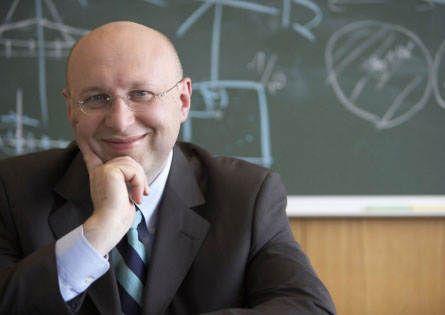 |
|
|
Stefan Hell, PhD |
Stefan Hell, PhD, will present “Nanoscopy with Focused Light” as the 17th Fredric S. Fay Memorial Lecture on Oct. 18. Dr. Hell received the Nobel Prize in Chemistry in 2014 for his work on overcoming the resolution limit of light microscopes using a method he developed called STED (Stimulated Emission Depletion) microscopy. He is director and a scientific member at the Max Planck Institute for Biophysical Chemistry, Göttingen, Germany, and head of the Optical Nanoscopy Division at the German Cancer Research Center in Heidelberg, Germany.
STED microscopy is a focused light-microscopy method that is not limited by the diffraction limit of light (~200 nanometers). Using traditional microscopy, proteins closer together than 200 nm cannot be resolved because the diffraction of light blurs them into a single image. STED microscopy can visualize subcellular structures in the 10-200 nm range, a 10-fold increase over traditional light microscopy, by using fluorescent labels that switch between a bright and a dark state.
Hell’s lab continues to develop new optical approaches, algorithms and fluorescent labels to improve resolution of single proteins. He applies these “nanoscopic” methods to probe diverse biological systems including changes in dendritic spine morphology in neurons, HIV proteolytic maturation, the role of cytoskeleton in a variety of cell types and dynamics of membrane proteins.
In addition to the Nobel Prize, Hell has received numerous national and international awards. Recent honors include the Carus Medal of the German National Academy of Sciences Leopoldina in 2013 and the Kavli Prize in Nanoscience in 2014, also the year Hell was elected into the Hall of Fame der deutschen Forschung .
The Fred Fay lecture is given in remembrance of the late UMass Medical School professor of physiology and his scientific contributions, particularly to the field of biomedical imaging. This year’s lecture will take place on Tuesday, Oct 18, at 3 p.m. in the Albert Sherman Center auditorium. A reception will immediately follow the lecture.